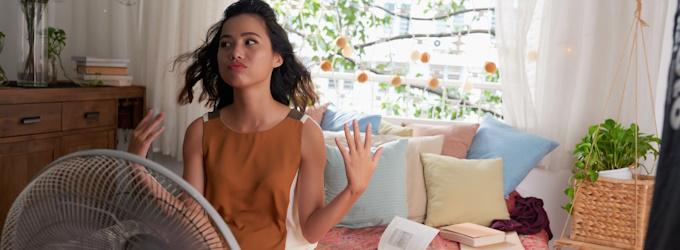Residential Heating and Cooling Equipment from Ruud Must Align to Your Home and Your Needs for Optimal Performance
We’ve heard all the tips and tricks to staying cool despite high temperatures and humidity, but there truly is only one way to fully defeat the scorching St. Louis heat this summer: by choosing an appropriate residential HVAC cooling system for your home and lifestyle.
Whether you get a new air conditioner or heat pump, you’ll enjoy energy efficiency and comfort indoors – no more sticking to your bed sheets or avoiding meal preparation because you can’t take the extra heat of the kitchen.
Keep reading to discover the basics of selecting your system and how to ensure its energy-efficient performance over time.
The Basics of Residential Heating and Cooling Systems
Your residential HVAC system plays a pivotal role in ensuring your home remains comfortable and livable, no matter the season. Central to this discussion are air conditioners and heat pumps, both of which are designed to regulate indoor temperatures.
Each system’s efficiency and suitability for your home depends on various factors, including the specific needs of your living space, your personal comfort preferences, and your aspirations for energy savings. Most homes in St. Louis are equipped with an air conditioner or a heat pump.
Understanding the fundamental differences and operational modes of these systems is the first step in navigating the options available for residential HVAC, guiding you toward making an informed decision that aligns with your requirements for summertime cooling and beyond.
Air Conditioners Are Ideal for St. Louis Summers
In St. Louis, where summer temperatures soar and humidity levels can make indoor environments feel unbearable, Ruud air conditioners stand out as the go-to solution.
These systems handle the intense heat by effectively removing indoor warmth and expelling it outside, creating a cooler, more comfortable living space.
The downsides of air conditioners are, of course, that you must have a separate piece of equipment for heating your home during chilly St. Louis winters, and your heater requires its own separate residential HVAC maintenance schedule and its own residential heating installation when you need to upgrade it.
With advancements in technology, today’s air conditioners offer improved energy efficiency, a critical factor to consider during the region’s lengthy and hot summer months. When choosing an air conditioner, look at the unit’s SEER (Seasonal Energy Efficiency Ratio) rating. A higher SEER rating equates to better energy efficiency, providing significant cost savings on energy bills while still delivering powerful cooling performance.
Heat Pumps Are Year-Round Solutions
Heat pumps have gotten lots of attention recently for their remarkable dual functionality, making them an excellent choice for people living in St. Louis. Their unique operation allows them to expel indoor heat during sweltering summer days, much like an air conditioner. Conversely, when the chill of autumn and winter ramps up, they adeptly reverse their process, introducing warmth into your home.
This seamless transition between residential heating and cooling modes positions heat pumps as a year-long ally in maintaining indoor comfort. Their efficiency is another compelling feature, often resulting in notable energy savings. This is particularly beneficial given the fluctuating climate of St. Louis, where energy usage can vary greatly with the seasons.
Opting for a Ruud heat pump can be a forward-thinking decision for those seeking an all-encompassing climate control solution that manages both the peak heat of summer and the cold snaps of winter, all while reducing energy consumption (and saving you money on your utility bills).
Residential HVAC Sizing and Professional Installation
Selecting the ideal size of your cooling system is crucial for achieving the desired comfort levels in your St. Louis home. A system that is too small will constantly overwork, failing to cool your space effectively, while an oversized system can cycle on and off too frequently, leading to wasted energy and higher utility bills.
This delicate balance is why involving a professional in the sizing and installation processes is so important. An expert from Meyer Heating & Air will conduct a thorough assessment of your property, considering factors such as square footage, ceiling height, window orientation, and insulation quality to determine the most efficient size for your cooling system.
During installation, we’ll ensure your system is set up correctly from the start, avoiding pitfalls like inadequate air flow or improper refrigerant levels. By the time we leave your home, your system will be operating at its peak, providing comforting cooling without using extra energy.
Residential HVAC Maintenance Ensures Long-Term Performance and Energy Savings
If you love how efficient your new air conditioner or heat pump is after we install it, then you’ll want to schedule consistent maintenance.
This can include:
- Replacing your air filter every 30 to 90 days.
- Keeping your AC condenser coils clean and free of debris.
- Scheduling twice-yearly inspections with Meyer Heating & Air.
During these inspections, our technician will make sure everything is clean and in proper working order, including your thermostat. Meticulous maintenance extends the useful life of your residential heating and cooling system and can reduce your energy bill by as much as 10% compared to if you did not provide maintenance.
Making the Right Choice
When deciding between an air conditioner and a heat pump, our team factors in your property’s layout, the frequency and intensity of usage, and whether you could benefit from the dual functionality of a heat pump throughout the year. We’ll also talk to you about your desire for energy efficiency and how we can help you save money on your utility bills. You can then make an informed decision when you understand system costs, maintenance needs, and functionality.
In St. Louis, your home should be a haven of comfort, regardless of how uncomfortable it is outdoors. Contact Meyer Heating & Air to learn more about our new Ruud HVAC equipment.

